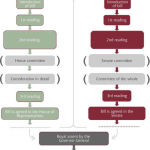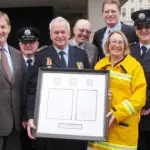
Once a bill is introduced into parliament it must pass through several stages and checks before it becomes legislation. This process is a long and sometimes complex one, and can vary depending on the type of bill being raised. It also varies slightly among the various Federal and State parliaments of Australia. The process begins with the drafting of a bill and ends with the granting of royal assent, public proclamation and enactment. For those who have lobbied or pushed for law reform, the granting of royal assent can be an important moment. The image above shows volunteer fire-fighters, who had lobbied for statutory recognition of volunteer rights, with a document of royal assent to a bill codifying many of their rights.
Described here is the process by which a bill becomes law in the Federal Parliament:
Introduction. Apart from appropriation bills, which must always begin in the House of Representatives, a bill can be introduced into either House of Parliament. Any MP can introduce bills (see private member’s bills) but they are usually raised by ministers. MPs are forewarned of bills being raised on the parliament’s Notice Paper (agenda).
First Reading. The minister or MP raising the bill begins by reading its short title aloud, then he or she hands the bill and an explanatory memorandum to the clerk. The clerk then reads its long title, formally introducing the bill into the parliament. The clerk will make copies of the bill available to other MPs, as well as placing it online for examination by the general public.
Second reading (speech). The minister or MP raising the bill delivers a speech, usually immediately after the first reading, in which he or she explains the necessity for the bill, what it contains and what it will achieve. This usually takes place immediately after the first reading. This provides an important context for the bill and the reasons for its formulation. These speeches are recorded in Hansard and may be consulted by judges who later must interpret the legislation.
Second reading (debate). After this introductory speech, discussion on the bill is deferred to a later date. This allows other MPs, the media and the general public to examine the bill and form their own conclusions and opinions. The deferment may be a few days or (more commonly) two or more weeks, depending on the complexity of the bill and the government’s urgency to see it passed. When debate commences, MPs from the government, the opposition, minor parties and independents may speak in turn on the bill. In theory there is no time limit for debate, however, major parties will generally negotiate a number of speakers, to avoid the process taking too long. A vote is held at the conclusion of debate and if a majority supports the bill, the process continues.
Consideration in detail (House of Representatives) and Committee of the whole (Senate). During these stages, the details of the bill are closely examined and discussed. Every section and clause of the bill is read and MPs are permitted to speak briefly about them. Amendments may be moved, such as the replacement, removal or addition of keywords. These stages are optional and may be bypassed if MPs do not object (this is usually the case for bills that are short or simple in scope, bills that repeal or amend other acts or bills that are supported by both major parties).
Third reading. If the bill passes through the second reading and committee stages, it is again moved by the original minister or MP. MPs are asked to vote for or against the motion; debate during this stage is rare. If a majority supports the bill then the clerk again reads its long title, signifying that the bill has passed the house.
The other House. Bills must pass both Houses to become law. Since most bills originate in the House of Representatives, once they have passed that house they are then transported to the Senate, where the above process is completed. The Senate may block the bill or suggest amendments, particularly if the government of the day does not enjoy a majority there. In practice a lot of negotiation about amendments occurs ‘behind the scenes’ between the government, the opposition, minor parties and independent MPs, to avoid the blocking or failure of bills.
 Royal assent. The final stage in the legislative process is the granting of royal assent by the Governor-General, who declares it to be law “…in the name of Her Majesty”.
Royal assent. The final stage in the legislative process is the granting of royal assent by the Governor-General, who declares it to be law “…in the name of Her Majesty”.
Proclamation and enactment. All new legislation is formally announced in the Government Gazette, along with the date on which it comes into effect; this is known as proclamation. The legislation becomes law on the specified date when it is considered to have been enacted.
© lawgovpol.com 2014. Content on this page may not be republished or distributed without permission. For more information please refer to our Terms of Use.

